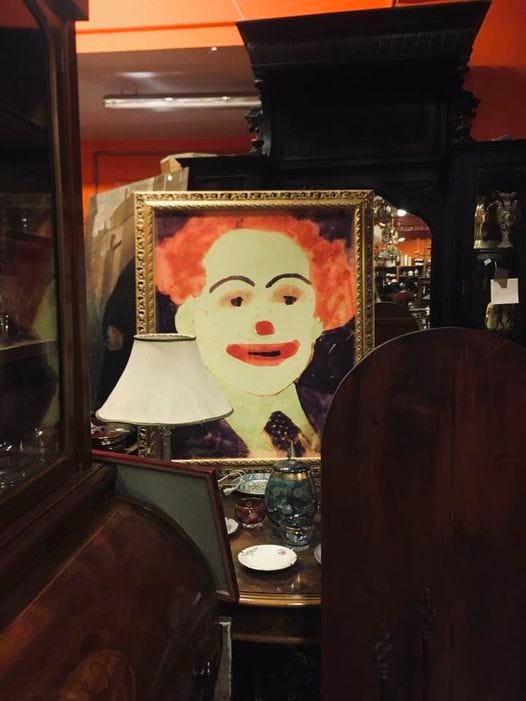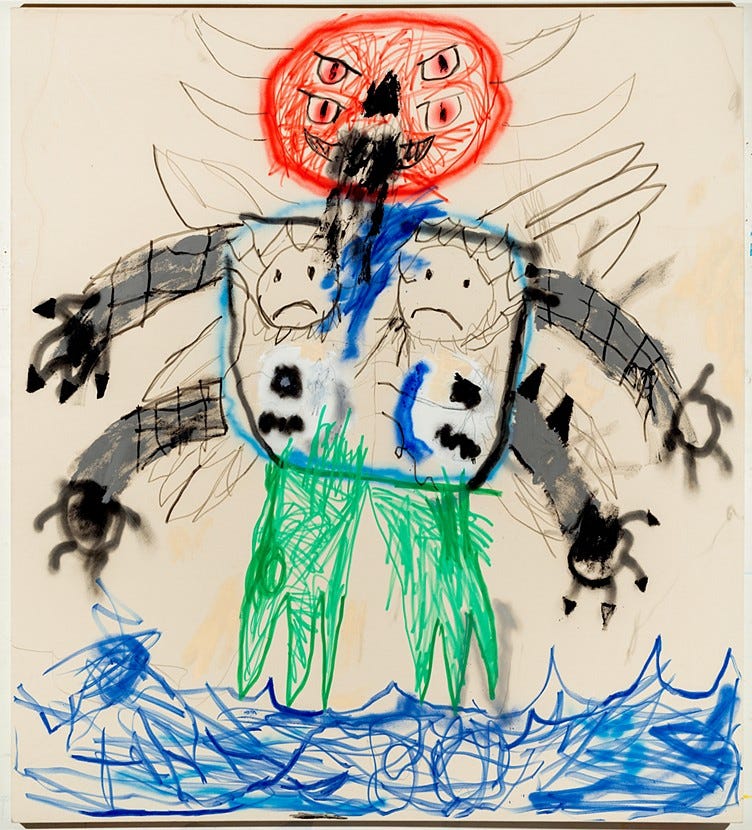Anarcho-Capitalism Always Ends in Tears
They're not completely wrong, but most of their ideas are dangerous and delusional.
I have always believed that we don’t choose our obsessions, they choose us. One of mine—as both a novelist and a human—is the ways in which our lives are shaped by social contracts. They are so tightly woven into the the warp and weft of our lives, we barely stop to consider them, let alone question their usefulness.
So, what are social contracts? Are they bad or are they good?
Money is a social contract. By money, at least in this context, I mean fiat currency: USD, yuen, yen, rubles, euros, baht, etc. None of these currencies has intrinsic value other than what we agree to. USD isn’t even backed by gold anymore. Which leads me to …
Gold is a social contract. Make no mistake: gold is an element and a mineral with many unique uses, but it’s no different than the handful of shells the Lenape Indians sold Manhattan for on May 24th 1626.
The U.S. Constitution is a social contract. People who live in the United States agree to be governed by the moral and political obligations outlined in the Constitution's social contract, but the document itself has no authority other than what we agree to give it.
Royalty is a social contract. The days when royalty as a leadership role was obtained through brute force are long gone. Nowadays, we collectively agree to use our tax dollars to support a familial line of ordinary humans that we call royalty, hold them to an impossible behavioral standard (this, too, falls under the rubric of a social contract), and revere them for deeply subjective reasons, most having to do with our fantasy of being a princess.
Religion is, perhaps, the single most influential social contract since it states so explicitly what “rules” you must follow. But there is no means of enforcing those rules other than human intervention (e.g., the Spanish Inquisition, the Salem Witch Trials, the Crusades). To be ruled by Divine Law, we must first agree to be governed by it; ergo, a social contract.
Property ownership is a social contract. Now, you might say, that’s not true, this is my house, and I paid for it. Yes, it’s true that if someone tried to strong arm your house away from you, there would be legal repercussions. But it is truer that neither you nor anyone can actually “own” a piece of the planet. That’s what I mean by social contract. We collaboratively agree that if a person pays enough money to a bank, they can own property. But “ownership” is signified by a paper filed at the County Recorder’s office.
Art as a commodity is a social contract. We must agree, and do, that a Mark Rothko painting is more valuable than this “treasure” I recently came across in an antique store. Like it? It’s still for sale.
In some cultures, perhaps, the value assigned to each painting might be in reverse. After all, a Mark Rothko is abstract and therefore harder for some people to appreciate, and this clown is representational and easier to understand. But even this proves my argument. We must “agree” to what is beautiful/valuable/worthy. Few phenomena demonstrate that better than art auctions where works like this one by Robert Nava sell for hundreds of thousands of dollars. We’ve agreed it’s valuable, therefore.
Cryptocurrency is so much a social contract that I find myself in a state of perpetual amazement that it exists at all. How on earth did we find ourselves here, where a line of code is worth actual money-in-hand? At the same time, how is digital cash any more or less delusional than our existing pieces of paper?
#
So far, Bitcoin and other cryptocurrencies resemble little more than a Ponzi scheme, and the wild claims made on their behalf betray a dangerous strain of libertarian thinking that has deep roots in the darkest, most charlatan part of the American psyche. Why? Because like capitalism itself, cryptocurrency is “the astonishing belief that the nastiest motives of the nastiest men somehow or other work for the best results in the best of all possible worlds.”Without oversight and regulation, especially in the financial markets, cryptocurrency (a social contract that prides itself on not needing government oversight and regulation) has proven time and time again that greed is an unavoidable part of who we are.
As of this writing, the value of Bitcoin has plummeted. Despite insistence by crypto believers that digital currency is unattached to financial markets and therefore not subject to market fluctuations, it turns out crypto is totally attached to financial markets. Macroeconomic factors such as interest rates, the war in Ukraine, and stubbornly high inflation have set crypto on its heels.
Is it gone forever? No. Is it the face of our future? I would say yes and no. The technological structure of blockchain (a nifty crypto invention that is essential to its operation) is slowly being adopted by the banking system, but for internal use only.
Crypto’s anarchist, no-oversight, no-regulation, no-statist vision is almost staggering in its naivete—a point that was brilliantly demonstrated in a six-part HBO docuseries I recently binge-watched called “The Anarchists.”
Not all crypto believers are anarchists, but many are. To be fair, this version of anarchy in no way resembles the French Revolution or any other lawless bloody coup of government by the people. Self-described anarcho-capitalists are generally peaceful folk who think that self-rule is more effective than government rule, especially when it comes to paying taxes.
It’s all great in theory. Government oversight can be oppressive. We are taxed at rates that feel unfair to some, we have no control over how or where that money is spent, and we generally resent any authority that tells us what to do. That’s about as American a sentiment as you will find anywhere. So, a group of these anarcho-capitalists led by Jeff Berwick (a drunk, problematic libertarian) moved to Mexico to realize some kind of “Don’t Tread on Me” utopia. Every year, they held a crypto-palooza event called Anarchapulco, which was so cringey, American, and hucksterish, it was almost harder to watch than the actual murder that took place there in 2019.
The group is largely disbanded now, an exodus set into motion by the murder but actually caused by preexisting fractures within the community. What fascinates me is how so many bright people, not only the Anarchapulco folks, but the geniuses (a term not used ironically) who created cryptocurrency, could simultaneously be that ignorant of human nature. For them, it’s all “government is bad,” “oversight is bad,” “regulations are bad,” “authority is bad,” but the minute things go wrong, who do you think they turn to?
When it comes to money—indeed, anything that is “valuable” or perceived as scarce and therefore worth having—there are always going to be people who are willing to juke the system so they can have more. They don’t don’t care if it’s legal. They simply want more and will stop at nothing to obtain it.
This is the lesson of history.
I despise the teachings of Ayn Rand (a proto-libertarian author who is both god and sovereign to all these anarchist folks, especially former U.S. Congressman Ron Paul, who fails to understand the problem inherent in being a representative of government and also a would-be architect of its destruction.)
But sadly, there is one thing about which Ayn Rand is correct: most people are in it for themselves.
To Rand, this was a virtue. To me, this is shortsighted for precisely the same reasons I detailed earlier in this article. The fate of civilization hangs in the balance of the social contract. Social contracts are predicated on trust. If we can’t trust each other, we will fall into chaos.
And it’s already pretty chaotic. There was an attempted overthrow of our government on January 6, 2021, a day of infamy that left me sobbing for my broken country. The Republican Party has made it abundantly clear that truth and democracy are far less important than winning at any cost. Legal, illegal, fair, unfair, constitutional or un-constitutional, the GOP is willing to auction off democracy itself if it gains them a single seat in Congress. Our nation of drowsing hippos seems oblivious to the very real danger that looms before it. Far too many Americans like those in “The Anarchists” believe deep in their hearts that if an issue doesn’t affect them, why bother worrying about it?
A majority of people will not work for the benefit of everyone if they don’t have to. They tend to do awful things when no one’s looking. Not all people, perhaps, but enough.
Oversight and regulation are not dirty words. Yes, they are sometimes improperly or unevenly applied, but that doesn’t invalidate their worth. It merely demonstrates how much care has to be taken to ensure that oversight benefits and protects the people without stifling progress. Look at Northern Europe. Oversight and regulation aren’t perfect there, either, but taken on the aggregate, they work.
Selfish people, shortsighted people, people who can’t be bothered to see things from any point of view but their own—these are the ones who wind up in backwaters like Anarchapulco or Ron Paul’s holiday parties. “Don’t tell me what to do” is something a teenager might say, and that is exactly how these crypto-anarchists, libertarians, and anarcho-capitalists think: like teenagers.
If we don’t start paying attention to the damage and destruction they are creating, the auctioning off of America will continue until there’s nothing left.
Maybe it’s already too late. But I, for one, am not going down without a fight.
Copyright © 2022 Stacey Eskelin
I want to hear from you—even if you disagree, I want to hear from you. Leave your thoughts in the comments section below.





Brilliant. And the social contracts you reference all begin with the careful socialization of children beginning when they are very young. Fail at that and all else comes a cropper.
When I really started writing during the pandemic, one of the things that I did was to try and follow things through to their natural conclusions. Similarly, I also tried to trace things back to their initial creations. In doing that, what I discovered was that most of our society is held together not with iron but with the whispiest spider webs of faith. Nixon resigned because he came up against the wall of the agreed upon social contract and had to admit that he had betrayed it. It was solid for him because, fundamentally, he believed in it. 45, on the other hand, just waltzed through it as if it were nothing more than a projection, which, much to my dismay, is true. There is no there there without agreement, belief and faith.
I've never understood how farmers could fight to have pesticides deregulated so that they could use whatever they want and to hell with everyone down river. Don't they understand that if they deregulate pesticides that it means that the farmers UPriver can also use whatever they want no matter what it does to our original farmer's land?
We cannot survive in anarchy. Well, the strongest and most devious among us can, but it would mean a state of almost constant warfare. There would be no time to enjoy any of the fruits of these regulated labors because nobody would be able to leave their cauldrons of molten metal long enough to create them.
45 is probably the most dangerous person we have ever encountered in our history because he is willing to let it all just fall away. He doesn't have faith in any of it. He sees the spider webs and is willing to just brush them all aside. Even he doesn't realize where that will end, but he's willing to take us there anyway. The people who hang on to him are just as ignorant of the consequences as he is.
I truly do think that the US needs to split in half. Let that half devolve into anarchy and do whatever it wants. Just leave our half alone. Of course, they won't be able to keep the lights on so they will start attacking us.
I wish I saw how any of this ends well. We've opened Pandorra's box and that shit is OUT.